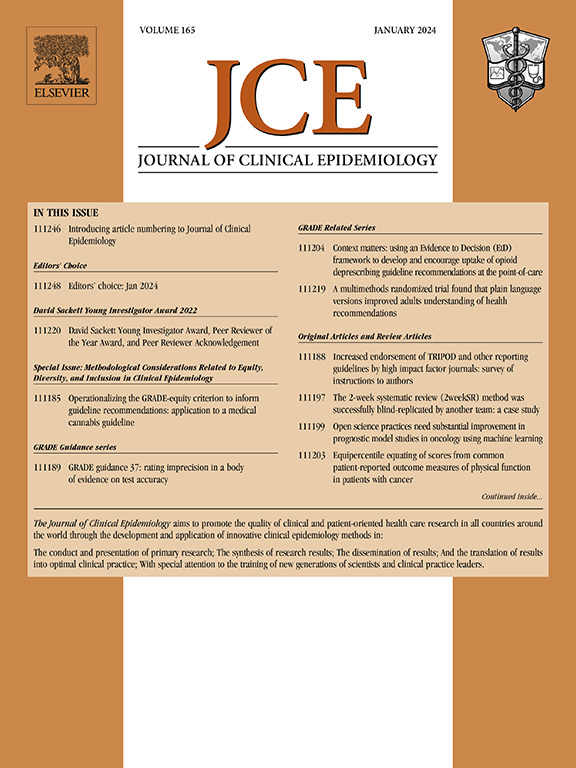试验的前瞻性注册:我们的现状、原因以及如何改进。
IF 7.3
2区 医学
Q1 HEALTH CARE SCIENCES & SERVICES
引用次数: 0
摘要
目标:透明的试验行为要求随机对照试验(RCT)在招收第一名参与者之前进行前瞻性注册。我们的目的是:(1)估算前瞻性注册的随机对照试验(RCT)的比例,并分析时间趋势以及与注册时间相关的因素;(2)评估不遵守前瞻性注册的原因,并探索改善遵守情况的方法。我们将风湿病学上发表的试验作为案例进行研究:我们搜索了2009年至2022年间风湿病学领域发表的RCT。我们进行了多变量逻辑回归,以确定与前瞻性试验注册相关的因素。我们向未进行前瞻性注册的试验的研究者发送了一份调查问卷,询问未坚持的原因和可能的解决方案:我们确定了 1093 项 RCT,其中 453 项(41.4%)未进行前瞻性注册。其中,130 项(11.9%)未登记,323 项(29.5%)进行了回顾性登记。前瞻性登记每年增加 3%(p 结论:尽管风湿病学领域的前瞻性注册情况有了明显改善,但遵守情况仍不尽如人意。针对期刊编辑、医护人员和研究人员的针对性策略可能有助于改善试验登记。本文章由计算机程序翻译,如有差异,请以英文原文为准。
Prospective registration of trials: where we are, why, and how we could get better
Objectives
Transparent trial conduct requires prospective registration of a randomized controlled clinical trial (RCT) before the enrollment of the first participant. We aimed to (1) estimate the proportion of RCTs that are prospectively registered and analyze the time trends and factors linked to registration timing and (2) assess the reasons for nonadherence to prospective registration and explore ways to improve compliance. We studied trials published in rheumatology as a case study.
Study Design and Setting
We searched for RCTs in rheumatology published between 2009 and 2022. We conducted a multivariable logistic regression to identify factors associated with prospective trial registration. We sent a survey to investigators of trials not prospectively registered, asking about reasons for nonadherence and potential solutions.
Results
We identified 1093 RCTs; 453 (41.4%) were not prospectively registered. Of these, 130 (11.9%) were not registered and 323 (29.5%) were retrospectively registered. Prospective registration increased by 3% annually (P < .001), with 13.3% (2 of 15) trials registered in 2009 to 73.2% (112 of 153) in 2022. In journals supporting the International Committee of Medical Journals Editors recommendations, 16% of trials published in 2022 were not prospectively registered. Prospective registration was associated with a larger sample size, multinational recruitment, and publication in higher impact journals. Investigators reported lack of knowledge or organizational problems as key reasons for retrospective registration. They suggested linking ethical approval to trial registration to ensure prospective registration.
Conclusion
Despite significant improvement, adherence to prospective registration remains unsatisfactory in rheumatology. Targeted strategies for journal editors, health-care professionals, and researchers may help improve trial registration.
Plain Language Summary
Randomized controlled clinical trials are a research type where people are randomly assigned to different treatments to see which works best. These treatments can include drugs, surgery, medical devices, or changes in behavior. The results obtained in RCTs are essential for the advance of medicine and for making medical decisions. Randomized controlled clinical trials need to be conducted in a transparent way to provide trustworthy information and avoid misleading findings. A key aspect of transparency is registering the study details and plan in a public repository before the trial starts. This not only requires researchers to plan their study in advance but also enables the scientific community to track any change in how the study is conducted. Although registration of RCTs is recommended, it is not compulsory. Questions remain about researchers’ compliance with prospective registration, and the factors that may affect it. In the present study, we systematically studied the registration practices of rheumatology RCTs published between 2009 and 2022. We reviewed how the trials were registered and used a statistical method (multivariable logistic regression) to determine what factors were linked to whether a trial was registered before it started. We also sent a questionnaire to researchers who either did not register or retrospectively registered their study, asking for their suggestions on how to improve adherence to proper registration practices. We found 1093 trials, of which 453 (41.4%) were not registered before they started. Among these, 130 (11.9%) were never registered and 323 (29.5%) were retrospectively registered. Trials with a larger number of participants, those involving recruiting centers from multiple countries, and those published in more prestigious journals were more likely to be registered in advance and adhere to transparency recommendations. Researchers who did not register their trial before it started reported that lack of awareness and organizational issues as the main reasons for not following these recommendations. They suggested that connecting ethical approval to trial registration could be a solution for ensuring adequate registration. We found that even though trial registration has improved in recent years, a considerable number of rheumatology trials are still not registered before they start. Based on our findings, we think that focusing on strategies for journal editors, health-care professionals, and researchers could help increase the number of properly registered trials.
求助全文
通过发布文献求助,成功后即可免费获取论文全文。
去求助
来源期刊

Journal of Clinical Epidemiology
医学-公共卫生、环境卫生与职业卫生
CiteScore
12.00
自引率
6.90%
发文量
320
审稿时长
44 days
期刊介绍:
The Journal of Clinical Epidemiology strives to enhance the quality of clinical and patient-oriented healthcare research by advancing and applying innovative methods in conducting, presenting, synthesizing, disseminating, and translating research results into optimal clinical practice. Special emphasis is placed on training new generations of scientists and clinical practice leaders.
 求助内容:
求助内容: 应助结果提醒方式:
应助结果提醒方式:


